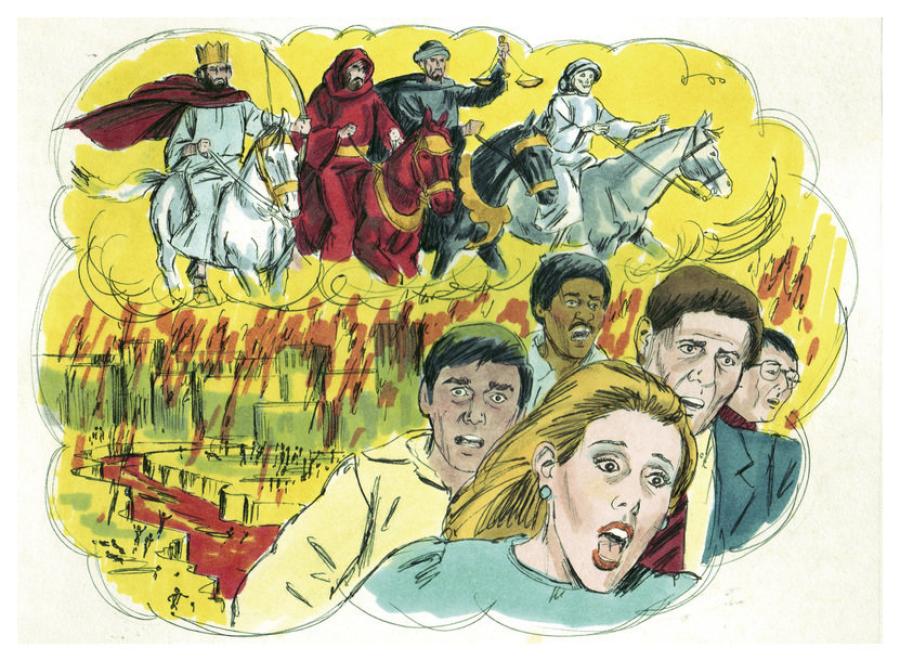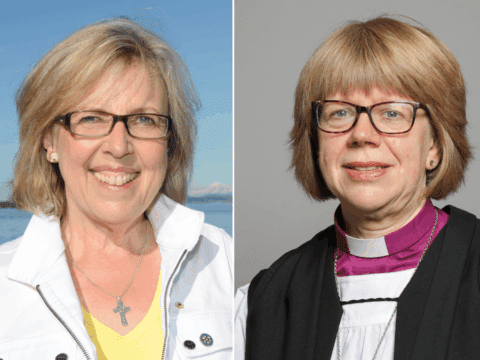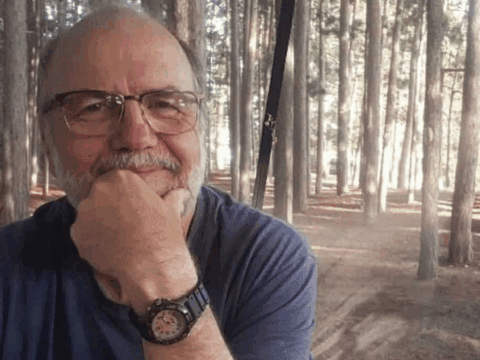Revelation, the last book in the Bible, has been one of the most polarizing. Some Christians have interpreted the rich visions of the author, someone named John, to depict the apocalypse, where only true believers will be saved. Wary of this interpretation and the violent imagery in Revelation, many other Christians have often just ignored it. With a new study guide, Revelation for Progressive Christians, B.C. United Church minister Donald Schmidt wants them to reconsider.
Q: So I found this very interesting, because as you mentioned in the study, it’s a book that has been weaponized. So what led you to want to do this?
You may unsubscribe from any of our newsletters at any time.
A: In the Lutheran magazine, maybe 30 years ago, there was a series of one-page editorials each issue by Walter Wangerin, a fairly well-known Lutheran author, about Revelation — sort of redeeming it, just focusing on little bits of it here and there, and going, “it’s not as bad as you think it is.” I was really stunned by what he was saying. I thought, “I’ve got to explore this book more,” and I’ve been exploring it and pondering it off and on since then. And it’s so rich and it’s so wonderful and it doesn’t have all the garbage that people constantly tell us is in there.
Q: So at one point did you decide that you wanted to do something like this to share with other people?
A: I’ve lead studies on it at four churches. Always pretty progressive churches, United Church of Christ in the U.S. or United Church of Canada. It always draws a crowd. People who are very timid, frequently who come and say, “I’ve never read it,” want to know more and that’s said to me that we really need to reclaim this book. It’s got good stuff in it. It’s for Christians who are struggling with how to live day-to-day, which is what most people are struggling with today. It is not about the end of the world, almost never really mentions the end of the world. Never once mentions the Antichrist. Yet all these things that people say are in there aren’t in there.
Q: In the study that you’ve done on it, why do you think that the dominant message from Revelation has been that it depicts the end of the world somehow?
A: I’m a Canadian but I spent more than 30 years in the U.S. I was amazed all the time that I was there how dominant end-of-the-world stuff is there, far more so than in Canada. And I think it’s because there is a large number of people who would love the world to end and they’re kind of longing for it before they have to deal with big issues in life. They’re sort of hoping the world will end and we’ll all be whisked away somewhere. And because there’s all sort of obscurity, mainly because the book is so richly set in its historic context—I don’t think John ever expected anybody to read it beyond his immediate audience—a lot of it depends on context which we don’t understand off the bat, and so it’s easy to manipulate it.
Q: What was your goal with the study? Was it to redeem the book or to spark conversation?
A: Probably a little bit of both. I really do want to redeem the book because I think it is a really good book for progressive Christians. I really think we need to read it, we need to hear what it says about how to live and we really need to get to the end of it where the Bible that started in the garden, ends essentially in a garden. It’s got some good, wonderful, “hope” stuff in it at the very end. People usually don’t get that far. So that was part of it, redeeming it. The other part was simply [to] invite people to explore different ways to understand and to ponder it and really to dig into it.

Q: There are points where you talk about different ways to understand the text or place it in the historical context. How much do you think of it is a message that John was trying to send to people in his current time period and how much do you think of it can actually be applicable to people’s lives today?
A: I think when he wrote it he was simply meaning it within his local and temple context. I don’t think he ever expected it to go beyond that place or that moment. It’s got a lot of political innuendo in it about Rome. He never calls it Rome, he always calls it Babylon. [There’s] a lot of stuff for people who were certainly feeling oppressed by Rome, certainly feeling Roman ideals were not in keeping with who they were as Christians. I guess because of that, I find it so very, very applicable. It’s for people who think, “well, there’s one set of values that the world is espousing, and then as I read Scripture, as I talk with other Christians, as I explore my own faith, maybe there are other ways to do things, maybe there are other ways to be Christian,” and I think this book gives us license to explore that a little bit more, and to go, “maybe there are responses to the Romes of our life that are different than what Rome is telling us.”
Q: Was there anything in the process of putting this study together that still really strikes you about this book? Is there a part of it in particular that you keep coming back to?
A: I think the whole ending is really quite delightful. All of the new heaven, the new earth stuff, where John talks about Jesus pitching his tent in our midst. Moving into the neighbourhood is one way it’s been translated as well. The idea that Christ is here and he’s not going away, that God is very present in our lives and in our world, and a strong sense that the book has that until we’re all on the boat, the boat is not pushing away from the shore. It’s a very inclusive book. Which is ironic, because it’s often been used very exclusively.
Q: You touched a little bit on the sometime-obsession that some Christians have with the end of the world. You said something about it being easier to think about that. Do you want to expand on that a little bit?
A: This is far more in the American context than elsewhere. In the U.S, there’s a strong sense of “the world is about to get us,” again, for a lot of people, not for everybody. So we better get rescued on the good side of things before anything bad happens. Classic case in point — I’m looking at the unbelievable obsession that many people are having right now about how a group of very poor Central Americans who are walking through Mexico are somehow going to destroy American life as many people know it, and this real sense that that’s going to bring not necessarily the end of the world, but certainly an absolute total end of everything that we know, and we must “fanatically” protect ourselves from it.
Q: Is there anything else that you wanted to share that came up when we were talking?
A: Just that I love the Bible, so I love writing Bible stories. (Publisher) Wood Lake thought probably publishing Revelation for Progressive Christians would be a good starting point, because it almost sounds like a conflict in terms for many people. I love doing this. I love encouraging people to read the Bible, look at what it really says. We have, frankly in the United Church but in a lot of progressive churches, we have this strong sense of letting other people define what it says, and assuming that they must be right and we just have to kind of begrudgingly close our eyes and plug our noses and pretend that the Bible isn’t there. And I’m like, “no, this is a good book for us.” Revelation is and other parts are as well, and we really need to read it, and we need to play with it and we need to not be scared of it.
This interview has been condensed and edited.














